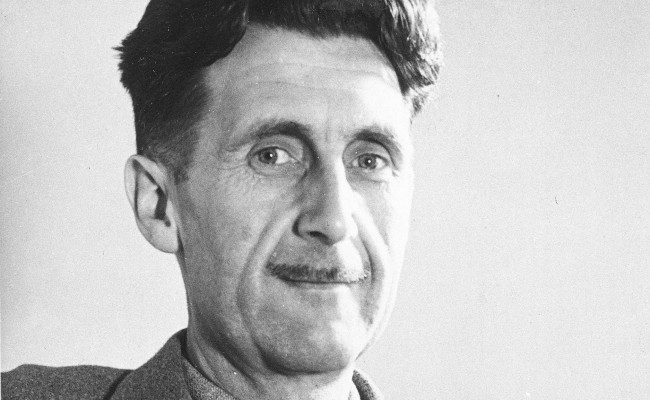The reputation of George Orwell, still one of the most widely read and admired twentieth century writers in English more than half a century after his death, hardly needs protecting. It was, then, interesting to see the self-appointed guardians of the flame line up to defend his honour when it was impugned last month by novelist and journalist Will Self in an article for the BBC.
Orwell, Self argued, was a literary mediocrity and, worse, an inflexible stickler for a conservative and unreasonably prescriptive style of English. ‘Self, of course, is a bit of a joke,’ declared the Telegraph’s Michael Henderson in response. Salon’s Laura Miller was not having a bar of it either, launching a literary attack of her own: ‘He [Self] is not so much an obscure writer as an exhausting one, and not always able to convince readers that the rewards his work offers will be worth the effort it takes to get them.’
It’s worth pointing out right away, as neither Henderson nor Miller bothered, that Self, by his own admission, has a lot of time for Orwell: he’s read The Road to Wigan Pier and Down and Out in Paris and London multiple times, can still detect ‘solid virtues’ in the novels Keep the Aspidistra Flying, A Clergyman’s Daughter and Coming up for Air, and finds that the essays can be ‘returned to again and again’. So what’s Self’s problem? It is, unsurprisingly for an author known for his ultra-modernist verbiage and penchant for archaic nouns, Orwell’s prose style. That seems, at first glance, a pretty soft target – not many people would argue that the lasting value of Nineteen Eighty-Four and Animal Farm has more to do with literary merit than political insight.
But Self, it turns out, has not really been thinking about Orwell’s novels but about the essays he claims to admire – indeed, one essay in particular, ‘Politics and the English Language.’ Written in 1945, it is still the one that everybody has read. It is the summa of the project Orwell as a writer never abandoned: to, in his own words, ‘make political writing into an art’. Even more famous than the essay itself are the six rules it contains, proposed by Orwell as inoculations against ‘stale or mixed images, all prefabricated phrases, needless repetitions, and humbug and vagueness generally’.
Self finds in the essay, instead, an Orwellian authoritarianism designed to privilege a certain kind of Standard English over different ways of saying things – for example, the more grammatically complex African-American Vernacular English. Even putting aside the weak attempt at a sort of ‘gotcha’ moment by turning Orwell’s anti-fascism back on the author, Self is, of, course talking humbug.
For a start, the essay is full of caveats that Self, tellingly, fails to mention: ‘Look back through this essay, and for certain you will find that I have again and again committed the very faults I am protesting against’; ‘… it has nothing to do with archaism, with the salvaging of obsolete words and turns of speech, or with the setting up of a “standard English” which must never be departed from’.
The qualifier most pertinent to Self’s analysis might, however, be this one: ‘I have not here been considering the literary use of language, but merely language as an instrument for expressing and not for concealing or preventing thought’. Self is wrong to argue that what Orwell was trying to do was put up the floodwalls against the rising tides of language change. What horrified Orwell was not the ‘pretentiously Frenchified folderol that deforms our noble tongue’ but the increasing use of opaque language to euphemise injustice and inhumaneness. The essay, far from advocating zero tolerance pedantry, highlights an obvious truth that is easy enough for anyone to grasp: that the debasement of politics and language is a two-way street. If Orwell were alive today he’d be far less bothered about the incorporation into English of African-American colloquialisms than he would be about the new weasel words being employed to, as he famously put it, ‘make murder respectable’: ‘collateral damage’, ‘regime change’, ‘kinetic military action’.
It’s worth pointing all this out because it matters now as much, if not more than, ever. Clive James reminds us why in this way: ‘Orwell’s style shows us why a style is worth working at: not just because it gets us a byline and makes a splash but because it compresses and refines thought and feeling without ceasing to sound like human speech – which is to say, without ceasing to sound human. At a time when ideological politics still exercised such an appeal that hundreds of purportedly civilised voices had ceased to sound human, Orwell’s style stood out. The remarkable thing is that it still does.’ There is an art to Orwell’s artlessness, a seductive clarity that is in itself ideological and about which James warns us that ‘that’s the very reason we have to watch him like a hawk’. Self’s final blunder is to ignore the inconvenient truth that Orwell, the man who said that ‘all art is propaganda’, was perfectly aware of this.
Orwell himself – who is still undervalued as a literary critic – was not beyond taking other popular writers to task. In one of his best essays, ‘Lear, Tolstoy and the Fool’, he carefully dismantled the great Russian writer’s deservedly little-read takedown of Shakespeare. At the end of the essay, Orwell writes: ‘one cannot answer Tolstoy’s pamphlet, at least on its main counts. There is no argument by which one can defend a poem. It defends itself by surviving, or it is indefensible.’ I have read and enjoyed the books and journalism of both George Orwell and Will Self, but there is no question in my mind as to whose work will defend itself by enduring the longest.






